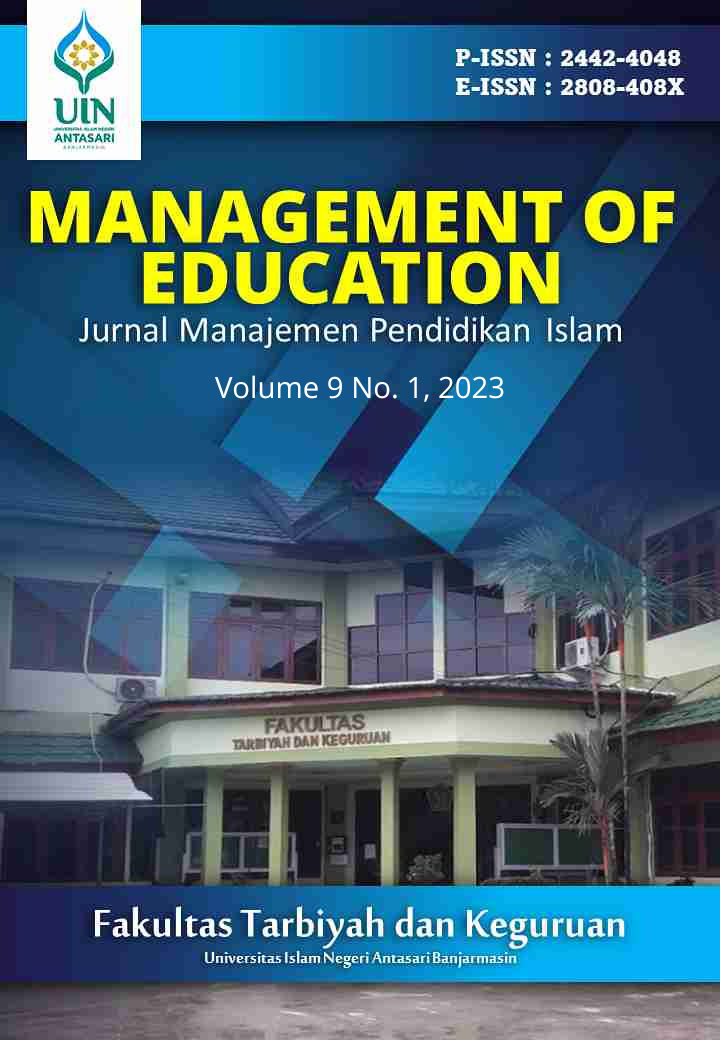PERBANDINGAN HASIL BELAJAR SISWA DENGAN MENGGUNAKAN MODEL KOOPERATIF TIPE NHT (NUMBER HEAD TOGETHER) DENGAN MODEL PEMBELAJARAN MAKE A MATCH PADA MATA PELAJARAN IPA MATERI CAHAYA DAN SIFATNYA DI KELAS V SD NEGERI 094166 SIDOTANI 1 TAHUN AJARAN 2022/2023
DOI:
https://doi.org/10.18592/moe.v9i1.8950Keywords:
learning outcomes, NAT (Number Head Together), Make A Match.Abstract
The problem in this research is the learning outcomes of students who have not completed classically in the science subject on light and its characteristics in class V SD Negeri 094166 Sidotani I Academic Year 2022/2023. This is because the implementation of learning is still teacher-centered. This study aims to find out whether the learning outcomes of students using the Number Head Together model are better than using the Make A Match model in the science subject on light and its characteristics. This type of research is quasi-experimental. This research was conducted at SD Negeri 094166 Sidotani L. The population for this study was all fifth grade students at SD Negeri 094166 Sidotani I, totaling 40 students and divided into two parallel classes. Data collection tools used were tests and data analysis used were normality tests, homogeneity tests. , the hypothesis test used was the two difference test. average (test 7). From the results of data analysis, it was obtained that student learning outcomes in the science subject matter of light and its characteristics after using the Number Head Together cooperative learning model in class V SD Negeri 094166 Sidotani I Academic Year 2022 / 2023 an average value of 86.93 was obtained and student learning outcomes using the Make A Match learning model obtained an average value of 167.93. So it can be concluded that student learning outcomes in the natural sciences subject of light and its nature were taught using the Number Head Together cooperative learning model better than those taught using the Make A Match learning model in class V SD Negeri 094166 Sidotani I Academic Year 2022/2023.References
Ahmadi dan Uhbiyati, 2011, Ilmu Pendidikan, Jakarta: Rineka Cipta Arifin, 2011, Psikologi Dakwah, Jakarta: Bumi Aksara
Arikunto, Suharsimi, 2010, Prosedur Penelitian Sebuah Pendekatan Praktek, Jakarta: Rineka Cipta
Arikunto, Suharsimi, 2011, Prosedur Penelitian Sebuah Pendekatan Praktek, Jakarta: Rineka Cipta
Daradjat, Zakiah, 2010, Metodik Khusus Pengajaran Agama Islam, Jakarta: Bumi Aksara.
Djamarah, 2011, Guru dan Anak Didik dalam Interaksi Edukatif, Jakarta: Rineka Cipta.
Hadi, Sutrisno, 2010, Metodologi Penelitian, Yayasan Fakultas Psikologi UGM Yogyakarta.
Hadi, Sutrisno, 2010, Metodologi Penelitian, Yayasan Fakultas Psikologi UGM Yogyakarta.
Husen, Ibrahim, 2012, Kenakalan Remaja, Jakarta: Gramedia.
Imron, Ali, 2010, Belajar dan Pembelajaran, Jakarta: Pustaka Jaya.
Poedarminta, WJS. 2011, Kamus Besar Bahasa Indonesia Jakarta: Balai Pustaka
Purwanto, Ngalim, 2010, Psikologi Pendidikan, Bandung: Rosda Karya
Soemanto, Wasty, 2011, Psikologi Pendidikan, Jakarta: Rineka Cipta
Sujanto, Agus, 2010, Kenakalan Remaja, Jakarta: Ichtiar Baru.
Tim Dosen FIP Malang, 2010, Pengantar Dasar-dasar Pendidikan, Surabaya: Usaha Nasional.
Downloads
Published
How to Cite
Issue
Section
License
Authors who publish with this journal agree to the following terms:
- Authors retain copyright and grant the journal right of first publication with the work simultaneously licensed under a Creative Commons Attribution 4.0 International that allows others to share the work with an acknowledgement of the work's authorship and initial publication in this journal.
- Authors are able to enter into separate, additional contractual arrangements for the non-exclusive distribution of the journal's published version of the work (e.g., post it to an institutional repository or publish it in a book), with an acknowledgement of its initial publication in this journal.
- Authors are permitted and encouraged to post their work online (e.g., in institutional repositories or on their website) prior to and during the submission process, as it can lead to productive exchanges, as well as earlier and greater citation of published work.









 This work is licensed under a
This work is licensed under a 